This is what happens when you statistically analyze works with interesting final episodes and works with terrible final episodes

When you watch a series, you may follow it all the way to the final episode and be impressed and say, ``That was a great ending,'' or you may be disappointed, saying, ``It was interesting at first, but the ending was terrible.'' A quantitative analysis of whether the final episode of the drama series was interesting or terrible for fans is summarized by statistical analysis by Daniel Paris of Stat Significant, who conducts various analyzes based on data.
Which Shows Got Their Finale Right, and Which Didn't? A Statistical Analysis

The more popular a drama series is, the longer it lasts and can take years to complete. The longer the series is, the more viewers enjoy it, but the expectations for the final episode that concludes the story continue to rise. A work that has a great finale enhances not only the ending but also the quality of the series as a whole. On the other hand, even if you enjoy watching a long series, if the final episode is terrible, it will make you think, ``I should have never watched this series.''
In order to quantify and evaluate the ``reputation of the final episode of a series'', Mr. Paris obtained data from IMDb , an online database for TV programs and streaming content, and calculated the ``average user rating of the final episode'' and the ``final episode''. We calculated a value comparing the average rating of all episodes other than the season. Based on these numbers, popular works with especially high viewer ratings are categorized into four categories: ``Great Finale,'' ``Satisfying End,'' ``Unfortunate Punchline,'' and ``Disaster.'' These are shown in the table.
The image below shows the results of ' Breaking Bad ' and ' Dexter ', which Mr. Parris showed as an example. The third from the left in the table is the ``average rating of all episodes except the final season'', and this value is ``8.61'' on a scale of 10 for the two works. The number to the right is the ``average user rating of the final episode'', with ``Breaking Bad'' being rated high at ``9.9'' and ``Dexter'' being rated low at ``4.7.'' The one on the far right is the ratio of ``how much the ratings have increased from the previous season to the final episode.'' The higher this number is, the better the ending is. It was evaluated as 'It was.'

◆Great finale
Mr. Paris considers works with 'great finales' to have an average rating score of over 9.4 for the final episode or a rating increase rate of over 10% for the final episode.
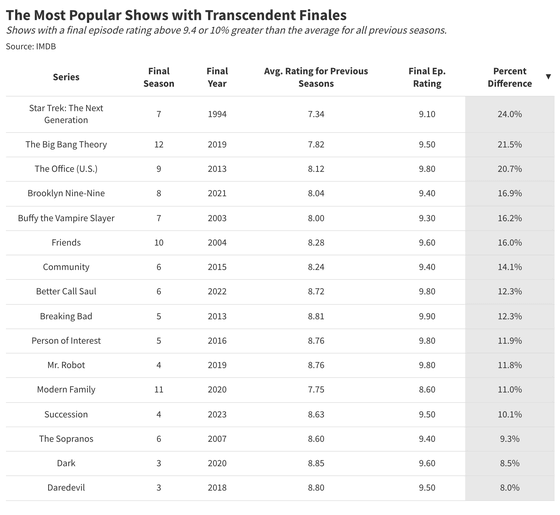
The Japanese titles of the 'Great Finale' list are as follows.
・
・Big Bang★Theory/Our Geeky Laws of Love
・The Office
・Brooklyn Nine-Nine
・Buffy ~The Cross in Love~
・Friends
・Komi Kare! !
・Better Call Saul
· Breaking Bad
・Person of Interest
・Mr. Robot
・Modern Family
・King of Media ~A Splendid Family~ (King of Media)
・The Sopranos Mafia of Sorrow
· dark
・Daredevil
“ New Star Trek ” had the highest rate of increase in ratings for its final episode. The rating up to the final season was not particularly high at 7.34, but the rating for the final episode was high at 9.10, resulting in an increase rate of 24.0%. Also, ` `The Sopranos: Sorrowful Mafia '' has the highest series average rating on the list, so the final episode has a fairly high rating of ``9.40'', but the increase rate is only ``9.3%''.
In addition, many comedies received high ratings for their final episodes. Regarding this, Parris said, ``I was surprised by this result because in comedy, the focus is more on the characters than the story, and I find it difficult to satisfy them with an ending. We don't need long, complex stories.'
◆Satisfying ending
Next, the following is a list of 'satisfying endings' that are good but not perfect. We include those where the difference between the final rating and previous ratings is within the range of -3% to 10%.
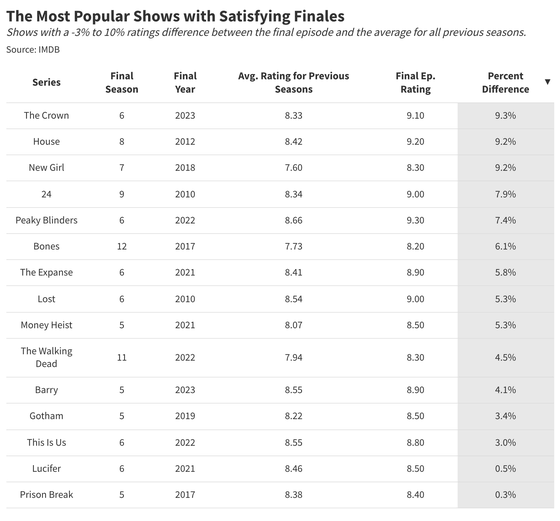
The following is a list of the popular works with high viewer ratings and the ``satisfying ending'' group, according to Mr. Paris.
・The Crown
・Dr.HOUSE
・New Girl/Uncool Girl and the Three Musketeers
・24 -TWENTY FOUR-
・Peaky Blinders
・BONES -Bones speak-
・The Expanse -The Behemoth Awakens-
・LOST
・Paper House
· the walking dead
・Barry
・GOTHAM/Gotham
・THIS IS US
・LUCIFER/Lucifer
· Prison Break
◆Unfortunate punch line
The reason why it is classified as 'Unfortunate Punchline' is that 'The final episode is not as highly rated as the highly rated works, but it is not bad enough to bring down the overall rating of the series. However, it does not meet the expectations from the series up to that point. This is not the final episode.'' This includes works whose final episode's rating increase rate was ``-10% to -3%'' from the previous series.
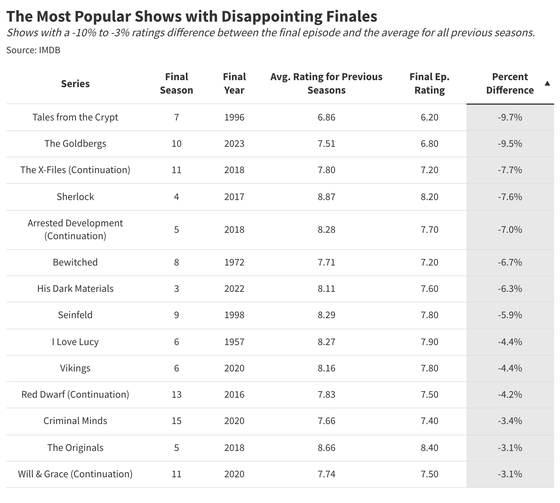
The 'unfortunate punch line' works that Mr. Paris showed are below. Note that '(new series)' written at the end of the title indicates a work in which a new series was created after the series had been completed, and the final episode of the new series. This is the evaluation.
・
・Go for it! goldberg family
・X-Files (new series)
・SHERLOCK
・The Bruce family goes wild! (Arrested Development) (New Series)
・My wife is a witch
・Dark Materials/Golden Compass
・Seinfeld
・I Love Lucy
・Vikings ~Conquerors of the Sea~
・Spaceship Red Dwarf (new series)
・Criminal Minds FBI Behavioral Analysis Division
・Originals
・Are you two friends? Will & Grace (new series)
◆Catastrophe
Works categorized as 'catastrophes' are works whose ratings difference between the previous season's average and the final episode is '-10% or less.' Paris says of these works, 'The ending will make you wish you had never been interested in this show in the first place.' Of the list below, `` Game of Thrones '' and `` How I Met Your Mother '' have such bad final episodes that, according to Paris, ``just looking at the title makes my blood boil.'' It was said that it was.
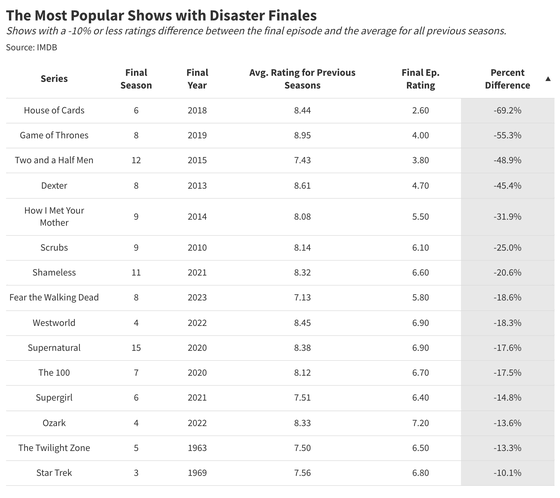
Below are the Japanese titles of the works that Mr. Paris listed as a 'catastrophe'.
・House of Cards Stairs of Ambition
· game of thrones
· Charlie Sheen Harper ★ Boys
・Dexter The police officer is a murderer
· how i met your mother
・Scrubs ~ Love Trouble Ward
・Shameless We have no shame
・Fear the Walking Dead
・Westworld
・SUPERNATURAL
· Hundred
・SUPERGIRL/Supergirl
・Welcome to Ozark
・
· Star Trek
As for the overall trend, Paris points out that ``long-running works are more likely to be disappointed in the final episode.'' Approximately 33% of the 'wonderful finales' and 'satisfying endings' had their final episodes after season 7. On the other hand, of the 'unfortunate punch line' and 'catastrophe' lists, about 60% of the works lasted for seven seasons or more. Mr. Paris previously conducted a statistic called ``Average Seasonal Decline in the Quality of TV Series'' and concluded that this turning point was around season 6, and this result is reinforced by the latest statistics. .
Finally, Mr. Paris shows a graph of the final ratings for each year in which the work was produced. According to the graph, looking at the entire 1960s, the proportion of ``great finales'' and ``satisfying endings'' has been increasing, while the proportion of ``unfortunate punchlines'' and ``catastrophes'' has been on the decline. I can say, 'I've gotten better at it.' However, in the 2020s, the quality of the final episode has deteriorated significantly. According to Paris, since 2018, the quality of television as a whole has been subtly declining, not just the final episode of the drama.
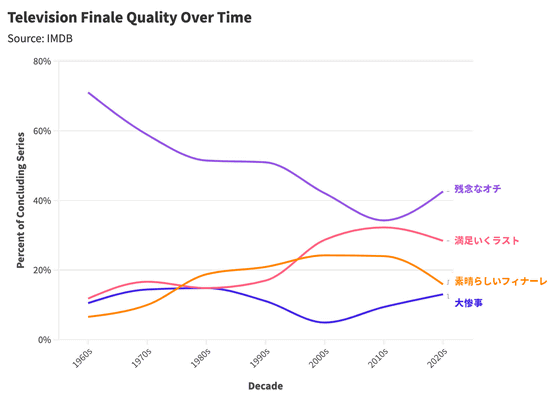
One possible reason for this is the rapid increase in drama content itself. The following is a bar graph showing the number of new content on streaming platforms focused only on works with English scripts, and you can see that the number has nearly tripled from 2009 to 2022.
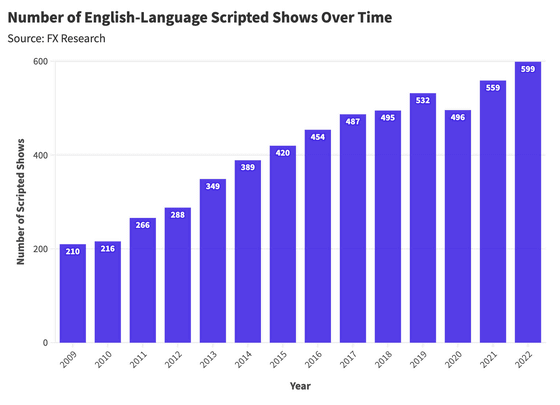
With the rapid increase in the amount of content being produced, the number of works that do not have a satisfying final episode is also increasing. However, compared to programs from the 1960s to 1980s, the overall quality of the production has improved.
In response to this statistical result, Paris said, ``In the streaming era, people often binge-watch a series and accept the final episode as the only ending.However, each episode is evaluated individually.'' Even if there's a scene you want to do and the final episode is terrible, it doesn't diminish the value of the previous work. A captivating final episode has value, but it completely determines the rating of the show. Maybe we should stop thinking like that.'
Related Posts:
in Note, Posted by log1e_dh







